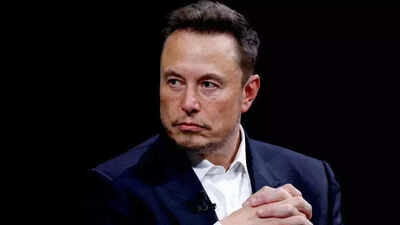Elon Musk issues chilling warning: This country will lose 1 million people by 2025 |

Elon Musk recently issued a stark warning about Japan’s severe population decline, stating that the country “will lose almost a million people this year.” He emphasized that artificial intelligence (AI) might be the only viable solution to reverse this alarming trend. Musk shared these insights on X (formerly Twitter), highlighting a growing demographic crisis marked by a significant gap between births and deaths—a gap that has been widening for decades. Japan’s shrinking population poses serious challenges, including a shrinking workforce and increasing pressure on healthcare and social services. Musk’s comments underscore the urgency of addressing demographic shifts, suggesting that technological advancements like AI could play a crucial role in supporting aging societies and mitigating the economic and social impacts of population decline.
Elon Musk highlights the urgency of Japan’s demographic decline
Musk’s post framed Japan’s problem as a long-term demographic trend, not a sudden shock or a side-effect of new technology. He argued the decline was “set in motion half a century ago” and explicitly disavowed the idea that AI caused it — then suggested AI might be the only practical tool to help reverse the effect. That combination of a stark number and a provocative prescription is what pushed his message into mainstream coverage.
Japan’s population decline: Record year of 900,000 more deaths than births and its root causes
Government and media reports show Japan’s population fell sharply in the latest year, with roughly nine hundred thousand more deaths than births reported — the largest single-year drop on record for the country. That gap is not a single datapoint: it reflects falling fertility (fewer births) plus an ageing population (more deaths). The immediate implication is fewer working-age people supporting more retirees, which strains pensions, healthcare and public finances.
Why this didn’t start yesterday: deep causes of Japan’s demographic decline
- Japan’s demographic trajectory is the result of multiple, long-running structural factors:
- Low fertility: decades of fertility rates below the replacement level (≈2.1 children per woman), driven by economic insecurity, high housing and childcare costs, and changing social norms.
- Rapid ageing: a large baby-boom cohort moving into retirement combined with high life expectancy.
- Delay or avoidance of marriage/childbearing: many younger adults delay relationships or choose smaller families for economic and lifestyle reasons.
- Labour and gender dynamics: persistent workplace expectations and limited family-friendly policies historically constrained people’s ability to combine work and childrearing.
These causes have compounded over 30–50 years, so reversing the trend requires more than short-term fixes.
Elon Musk explains Japan’s population decline and how AI could help address it
Elon Musk emphasised that AI did not create Japan’s low birth rate or ageing population; rather, the demographic decline grew from social and economic patterns over decades. At the same time, he argued AI could help mitigate some consequences by automating labour, improving healthcare delivery for elderly populations, and enabling technologies (robot caregivers, productivity gains) that reduce dependence on a shrinking workforce. That view treats AI as a tool to manage symptoms (labour shortages, care needs) rather than a cure for low fertility. Musk has repeatedly framed under-population/low fertility as a civilisational risk. He has urged people who choose to have children to consider three children as a target to stabilize population levels. He has also publicly dismissed overpopulation fears, calling them a harmful myth — a stance he has reinforced in multiple posts. Critics and many demographers disagree with Musk’s tone and prescriptions, arguing that demographic futures are more complex and that policy — not exhortation — is what moves birthrates.
Japan’s population decline: What experts say about solutions
Demographers acknowledge serious risks from rapid population decline (labour shortages, fiscal pressure), but they caution against alarmist takes and single-solution claims. Many point to: Policy mixes (childcare subsidies, parental leave, housing support) as the historically effective levers for nudging fertility.Immigration as a pragmatic near-term tool to bolster the workforce.Technological aids (automation, AI) to reduce the economic pain of fewer workers, but not as a standalone “fix.” Academic and policy critiques also note that countries with falling birthrates can still maintain high living standards with the right reforms — so “collapse” is not inevitable, but the challenge is real.
How Elon Musk views Japan’s demographic decline
If policymakers want to stabilise population or soften the effects of decline, the likely toolbox includes:
- Family support policies: targeted childcare, affordable early-education, paid parental leave and housing incentives.
- Gender-equal labour reforms: flexible work, stronger protections for working parents, and removing career penalties for caregiving.
- Immigration and integration policies: addressing immediate labour shortages while building social cohesion.
- Automation and AI deployment: sensible use of technology to raise productivity and ease elderly care burdens — but paired with social policy to support families.
- Cultural and economic measures: tackling job insecurity, precarious work, and the high cost of raising children in expensive cities.
Elon Musk sparks debate on Japan’s population decline
Japan is the poster child because its decline is extreme and well-measured, but many developed countries face similar fertility trends (South Korea, Italy, Germany and others). The stakes include long-term economic dynamism, pension solvency, care systems and even geopolitical capacity. That’s why comments from high-profile figures like Musk draw attention — they compress complex policy debates into vivid, sometimes polarising, statements. Musk’s intervention is useful in that it highlights a genuine, large-scale risk: sustained low birthrates plus rapid ageing create policy problems that every advanced economy will face in coming decades. But AI is not a magical substitute for the social, economic and policy changes that encourage family formation or manage ageing populations. The most durable path combines smart public policy, sensible immigration, supportive workplaces and responsible technological adoption — not a single silver bullet.Also Read | ChatGPT-5 can now detect cancer and other major health conditions, claims OpenAI





